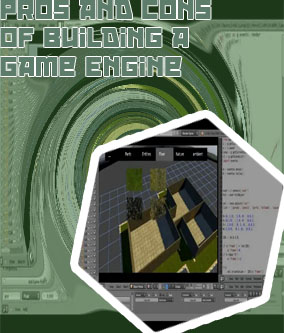

Create game engineGameMaker featuresThe best mobile game engine for iOS devices, SpriteKit is popular for 2D game creations. The official product of Apple, SpriteKit offers support for custom OpenGL ES shaders and lighting, new effects and animations, enhanced physics, integration with SceneKit, and more. To make your games look more realistic, you can use it to generate lighting effects as well. Its engine is smart enough to detect collisions to provide your game more realistic touch. SpriteKit is suitable for creating games and graphically rich app UIs as well. Its ability to leverage Metal for achieving high-quality rendering makes the game a perfect pick for building high-quality 2D games. Making a game engine Stride (C#). Although it was mentioned multiple times, I had a hard time finding out much about this engine. Apparently, this is Silicon Studio\u2019s Paradox engine, which was renamed Xenko, and then later renamed Stride. I\u2019m not sure if any notable games have shipped on it, but like Unity, it is a C#-focused engine, and comes with a full editing environment.

Game engine developmentRustConf 2018 - Closing Keynote - Using Rust For Game Development by Catherine West - YouTube is a good talk in that space. Unbundling the Game Engine: The Rise of Next Generation 3D Creation Engines There are many different tricks you can do with voxel data that allows you to achieve these goals, some are efficient programming tricks, others are rendering optimizations. Once you get used to visualizing the simple voxel data there are many fascinating things you can achieve, and hopefully these guides will show you the mysteries behind a good voxel engine. Step 7: Develop a Rendering EngineLeague of Legends: Team-based strategy MOBA with 152 million average active monthly players, won The Game Award for Best Esports Game and BAFTA Best Persistent Game Award. Emerging Technologies in game development I’ve never really considered using a game engine. Using an engine would remove a lot of the fun for me. I like programming and I find it easier to motivate myself to work on the programming parts. Creating all the graphics, sound, dialog, etc. is the tedious part (even though I want to do it).
Make own game engineLike Blender, many game engines – and their associated tools – generate and use their own reflection data. There are many ways to do it: You can parse your own C/C++ source code to extract type information, as Blender does. You can create a separate data description language, and write a tool to generate C++ type definitions and reflection data from this language. You can use preprocessor macros and C++ templates to generate reflection data at runtime. And once you have reflection data available, there are countless ways to write a generic serializer on top of it. And publish them everywhere So, should you make a game engine? You tell me! If you want to make a game as quickly as possible, just pick an existing engine and be happy. If you want to grow as a game developer, secure your future projects, and you have all the time in the world, then make a game engine! In any other case, you'll have to decide for yourself instead of relying on an stranger from the internet :) |
